You are here
New Releases
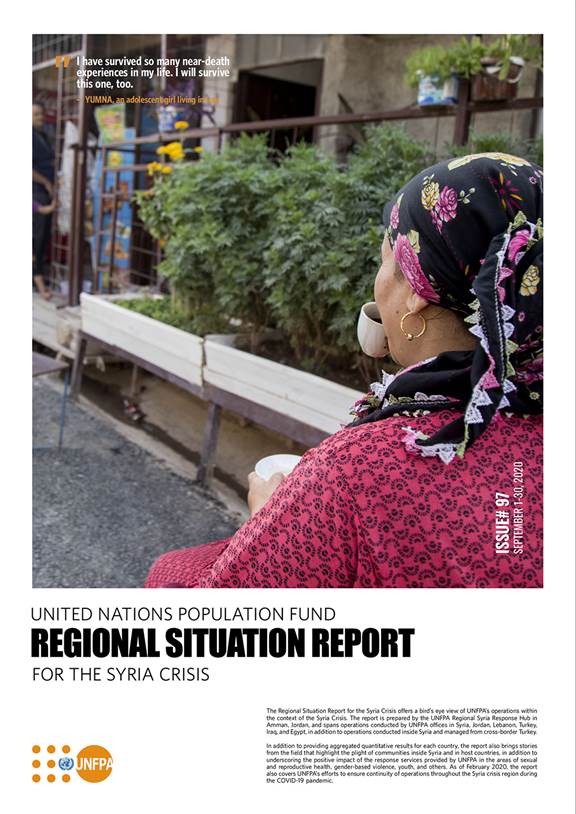
UNFPA Regional Situation Report for the Syria Crisis - September 2020
The Regional Situation Report for the Syria Crisis offers a bird’s eye view of UNFPA’s operations within the context of the Syria Crisis. The report is prepared by the UNFPA Regional Syria Response Hub in Amman, Jordan, and spans operations conducted by UNFPA offices in Syria, Jordan, Lebanon, Turkey, Iraq, and Egypt, in addition to operations conducted inside Syria and managed from cross-border Turkey.
In addition to providing aggregated quantitative results for each country, the report also brings stories from the field that highlight the plight of communities inside Syria and in host countries, in addition to underscoring the positive impact of the response services provided by UNFPA in the areas of sexual
and reproductive health, gender-based violence, youth, and others. As of February 2020, the report also covers UNFPA’s efforts to ensure continuity of operations throughout the Syria crisis region during the COVID-19 pandemic.
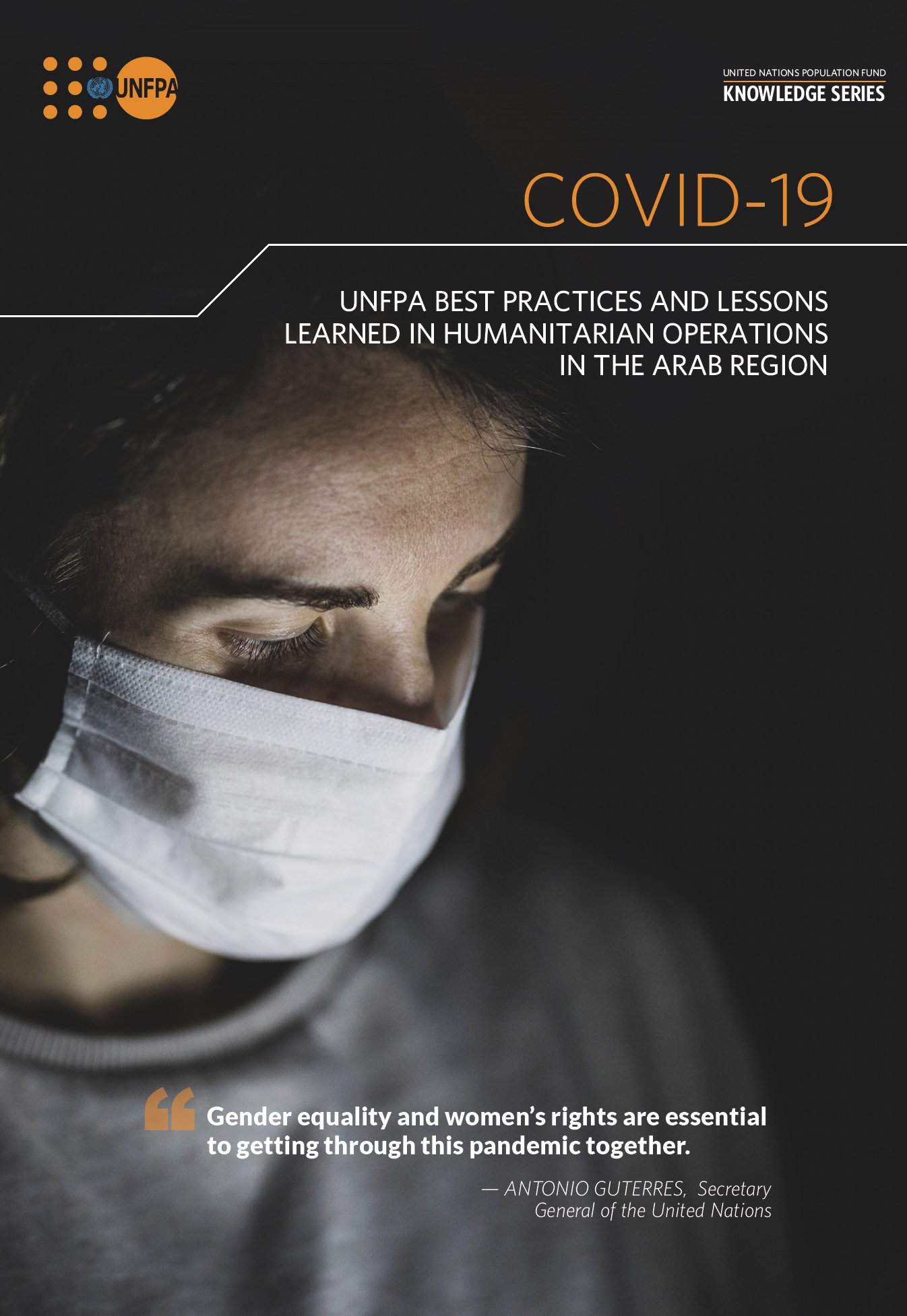
COVID-19: UNFPA Best Practices and Lessons Learned in Humanitarian Operations in Arab Region
The COVID-19 pandemic continues to redefine the realities of nations throughout the world, creating new and unprecedented challenges. The pandemic and its long-term ramifications have revealed many of the structural issues that underlie societies, highlighting systemic inequalities across race, gender, socioeconomic status, and others. In humanitarian contexts, the pandemic has exacerbated the challenges already impacting communities in need, be it through health risks, the economic fallout, or on human rights and social harmony.
This is especially true for women and girls who, as is the case with most humanitarian crises, continue to bear the brunt of the pandemic. In addition to being at higher risk of contracting the virus due to shouldering a larger portion of frontline response and caretaking responsibilities, women and girls continue to face higher risks of gender-based violence, which have been significantly heightened in light of the pandemic and its consequences. The web of violence besetting them has only expanded; movement restrictions have meant that more women and girls will face even greater difficulties accessing basic sexual and reproductive health services, while those suffering violence at home are no longer able to escape their abusers. Meanwhile, the socioeconomic fallouts have heightened the risks of exploitation and negative coping mechanisms like child and forced marriage. Additionally, as governments shift resources away from development and towards pandemic response, investments in challenging social norms that stifle the rights of women and girls will become even less of a priority, and threatens the progress achieved in past years.
Since the onset of the pandemic, UNFPA has been aware of these risks and challenges, and has made significant changes to its programmes to ensure they are being addressed. UNFPA offices throughout the Arab states region have continued to focus on innovations and alternative solutions that guarantee the continuity of services to those in need, maintaining safe access to health facilities that provide sexual and reproductive health services while tailoring programmes to allow for continued support to survivors of gender-based violence. This document captures some of these efforts, outlining the lessons learned and offering a simple blueprint that can be replicated in other contexts.
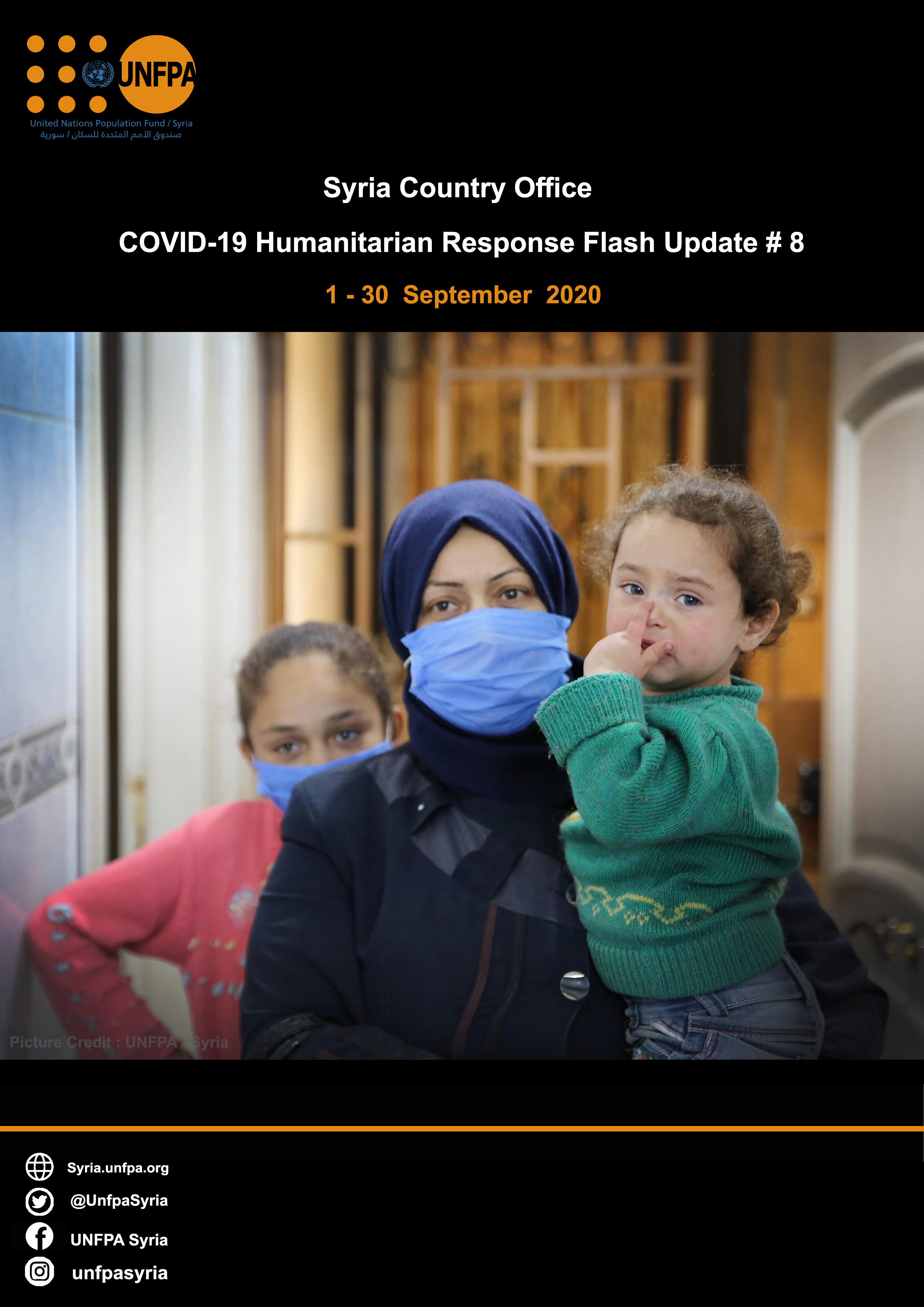
UNFPA Syria - COVID-19 Humanitarian Response Flash Update #8 / 01- 30 September 2020
As of October 13, 2020, the Syrian Ministry of Health (MoH) has reported 4,826 COVID-19 cases across Syria: 3,231 active, 1,364 recoveries and 231 registered deaths. The first positive case was announced on 22 March 2020, with the first fatality reported on 29 March 2020.
Highlighting the particular risks faced by healthcare workers, according to the Syrian MoH, 143 healthcare workers have tested positive for COVID-19. This includes 59 in Damascus30 in Lattakia; 14 in Rural Damascus; 9 in Aleppo; 7 in Hama;6 each in Quneitra, Tartous and Dara’a; 3 in Al-Hassakeh; 2 in As-Sweida; and 1 in Homs. Of particular concern, 11 healthcare workers are reported to have died, on the 3rd of September.
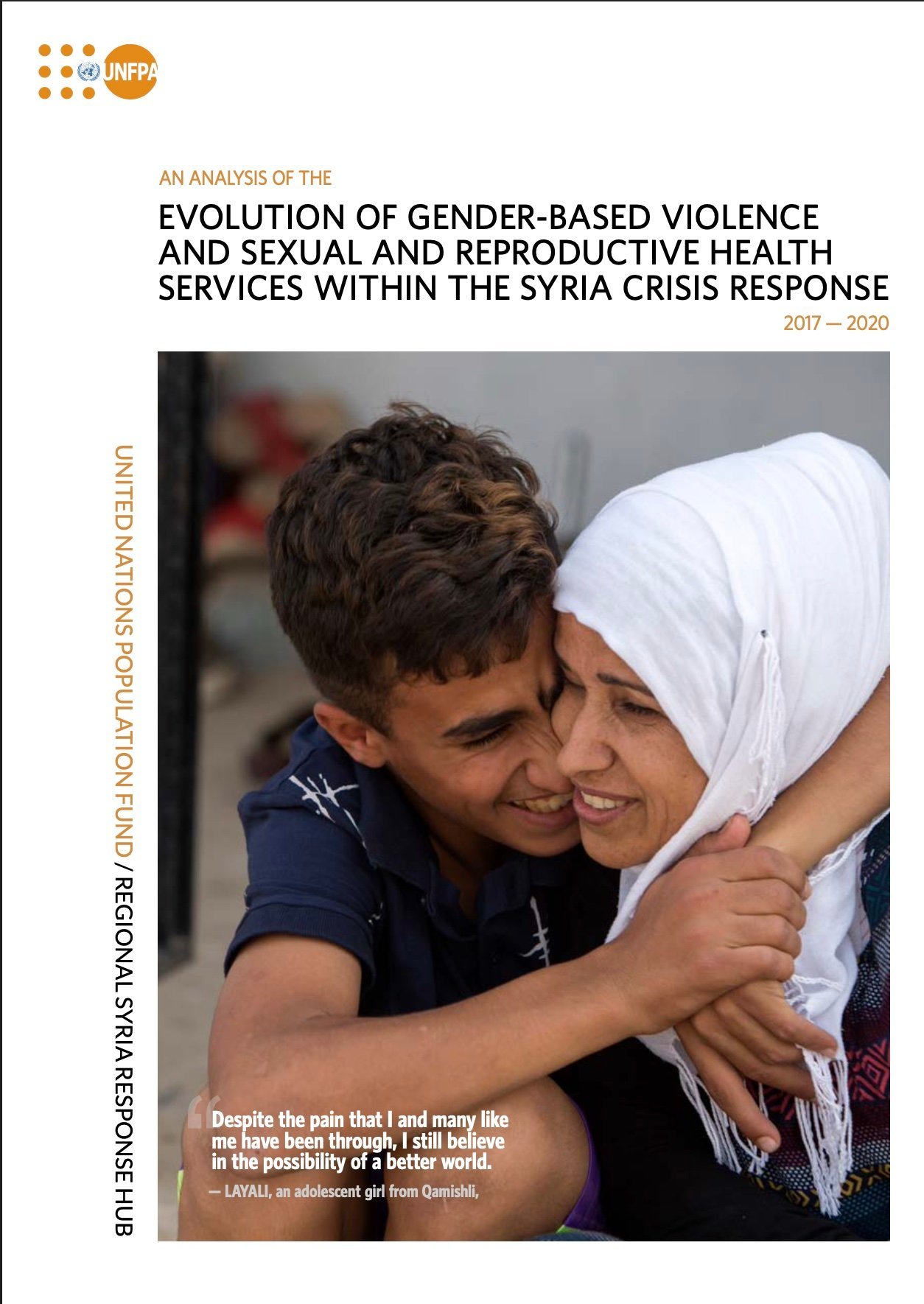
EVOLUTION OF GENDER-BASED VIOLENCE AND SEXUAL AND REPRODUCTIVE HEALTH SERVICES WITHIN THE SYRIA CRISIS RESPONSE
The conflict in Syria has generated one of the most severe and protracted humanitarian crises ever faced. Now into its 10th year, over 5.5 million refugees are still registered1 in five neighbouring countries and over six million people are currently displaced within Syria. This represents the largest displacement of population in the world.
UNFPA is ensuring the overall coordination and harmonisation of the Syria Crisis Response through the UNFPA Regional Syria Crisis Response Hub (the Hub) of the Arab States Regional Office (ASRO) based in Amman, Jordan. In the context of the crisis response, the UNFPA Regional Priorities are aligned with the Strategic Plan and reflected in the Protection and Health Chapters of the Regional Refugee and Resilience Plan (3RP), the inter-agency plan designed to coordinate and support the efforts of the five refugee hosting countries, as well as in the Syria Humanitarian Response Plan (HRP) that covers Syria and cross-border operations into Syria. The relevant overall objectives are the following:
To prevent and respond to gender-based violence;
Strengthening Reproductive Health services in impacted areas.
In order to gain a better understand and capture what has worked in the gender-based violence and sexual and reproductive health responses in the region, the UNFPA the Regional Syria Response Hub has commissioned an analysis of the evolution of the gender-based violence and sexual and reproductive health services over the past three years (2017-2020), whose methodology, main findings, recommendations, and points of advocacy are the object of this report. This report captures the main finding of this analysis and highlights interesting responses and initiatives. Based on these a set of programme and policy recommendations are made to inform future gender-based violence and sexual and reproductive health programmes.
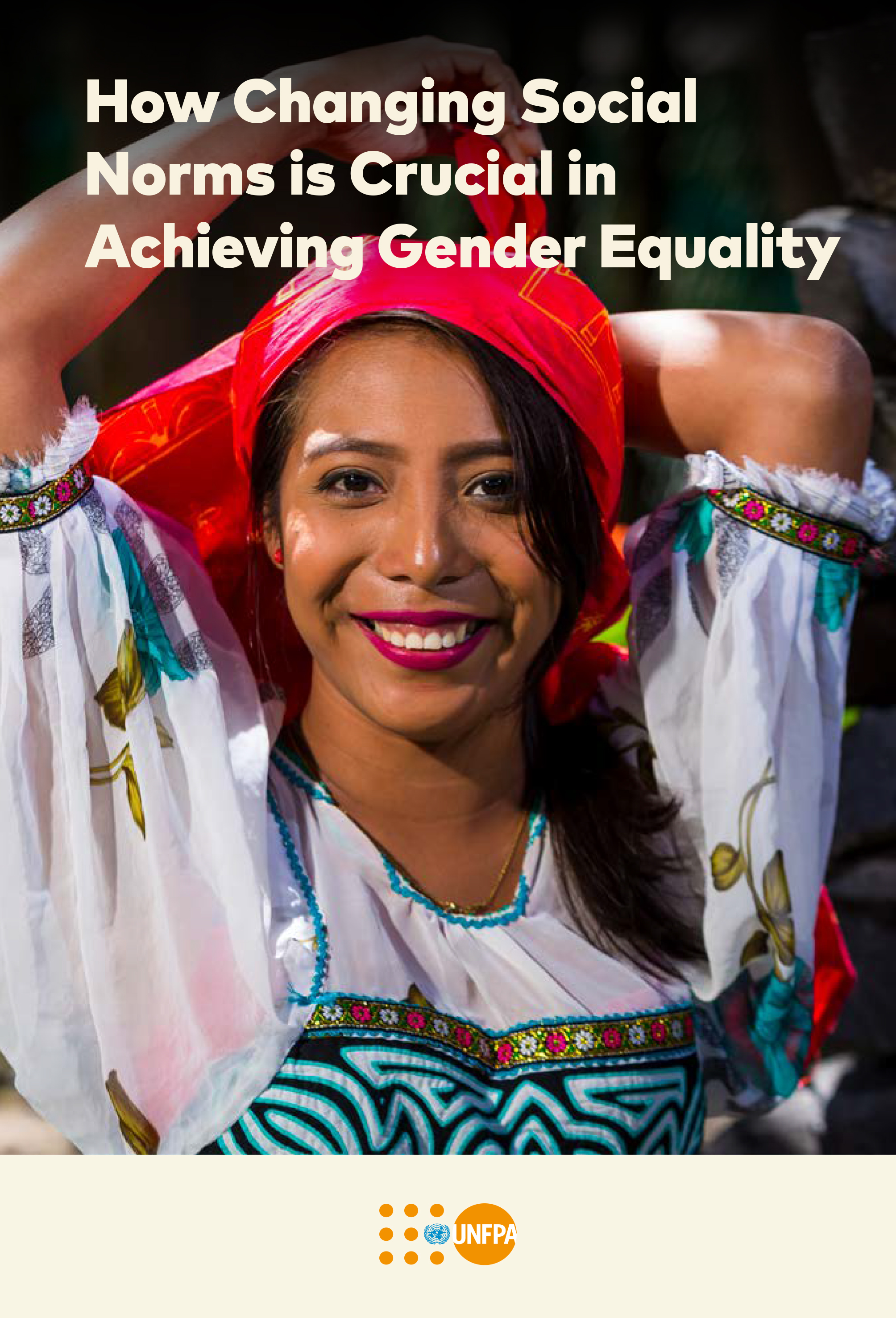
How Changing Social Norms is Crucial in Achieving Gender Equality
UNFPA has released this compendium on social norms change to achieve gender equality, which provides a framework for programmatic approaches to norms change at scale.
This document presents some of the most promising strategies for changing social norms and achieving gender equality. A greater understanding of the conceptual background of social norms and norms change provides a schematic – a skeleton outline – for social transformation. The compendium presents the tested processes of social norms change and a programme design framework, as applied to programming to end female genital mutilation. These processes are iterative, simultaneous and self-reinforcing and can be applied to other thematic areas of sexual and reproductive health and rights.
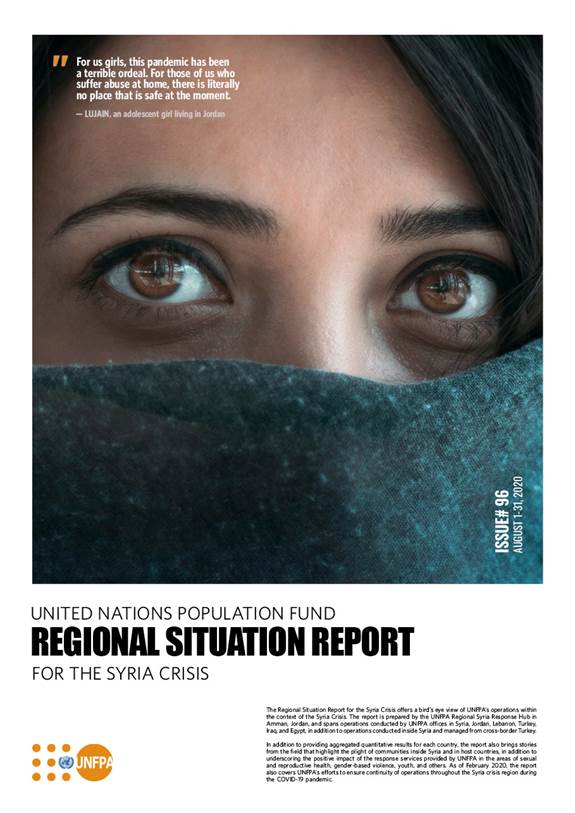
UNFPA Regional Situation Report for the Syria Crisis - August 2020
The Regional Situation Report for the Syria Crisis offers a bird’s eye view of UNFPA’s operations within the context of the Syria Crisis. The report is prepared by the UNFPA Regional Syria Response Hub in
Amman, Jordan, and spans operations conducted by UNFPA offices in Syria, Jordan, Lebanon, Turkey, Iraq, and Egypt, in addition to operations conducted inside Syria and managed from cross-border Turkey.
In addition to providing aggregated quantitative results for each country, the report also brings stories from the field that highlight the plight of communities inside Syria and in host countries, in addition to underscoring the positive impact of the response services provided by UNFPA in the areas of sexual and reproductive health, gender-based violence, youth, and others. As of February 2020, the report also covers UNFPA’s efforts to ensure continuity of operations throughout the Syria crisis region during the COVID-19 pandemic.
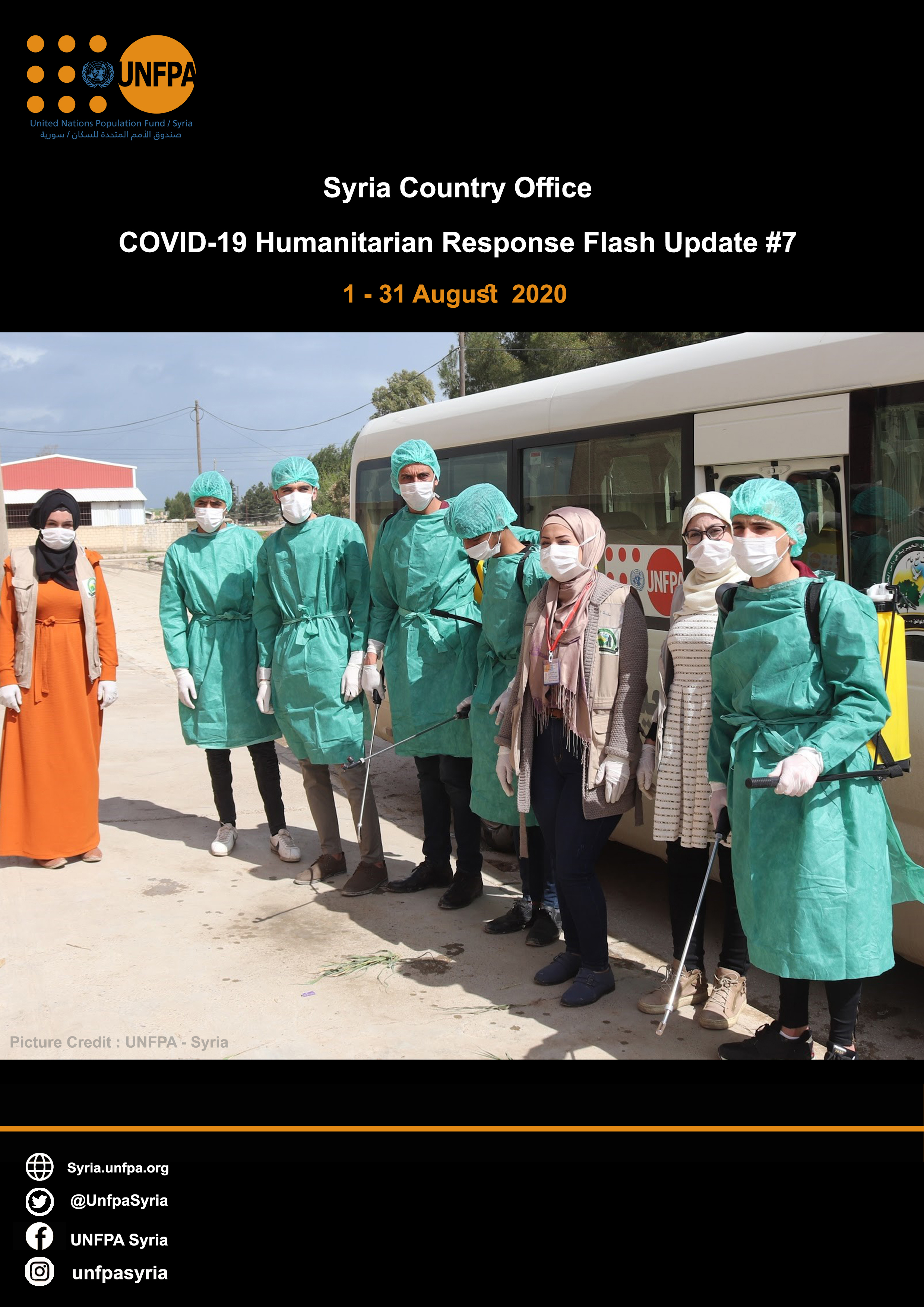
UNFPA Syria COVID-19 Humanitarian Response Flash Update #7 - 01- 31 August 2020
As of September 15, 2020, the Syrian Ministry of Health (MoH) has reported 3,654 COVID-19 cases across Syria: 2,602 active, 889 recoveries and 163 registered deaths. The first positive case was announced on 22
March 2020, with the first fatality reported on 29 March 2020.

UNFPA Regional Situation Report for the Syria Crisis — July 2020
The Regional Situation Report for the Syria Crisis offers a bird’s eye view of UNFPA’s operations within the context of the Syria Crisis. The report is prepared by the UNFPA Regional Syria Response Hub in Amman, Jordan, and spans operations conducted by UNFPA offices in Syria, Jordan, Lebanon, Turkey, Iraq, and Egypt, in addition to operations conducted inside Syria and managed from cross-border Turkey
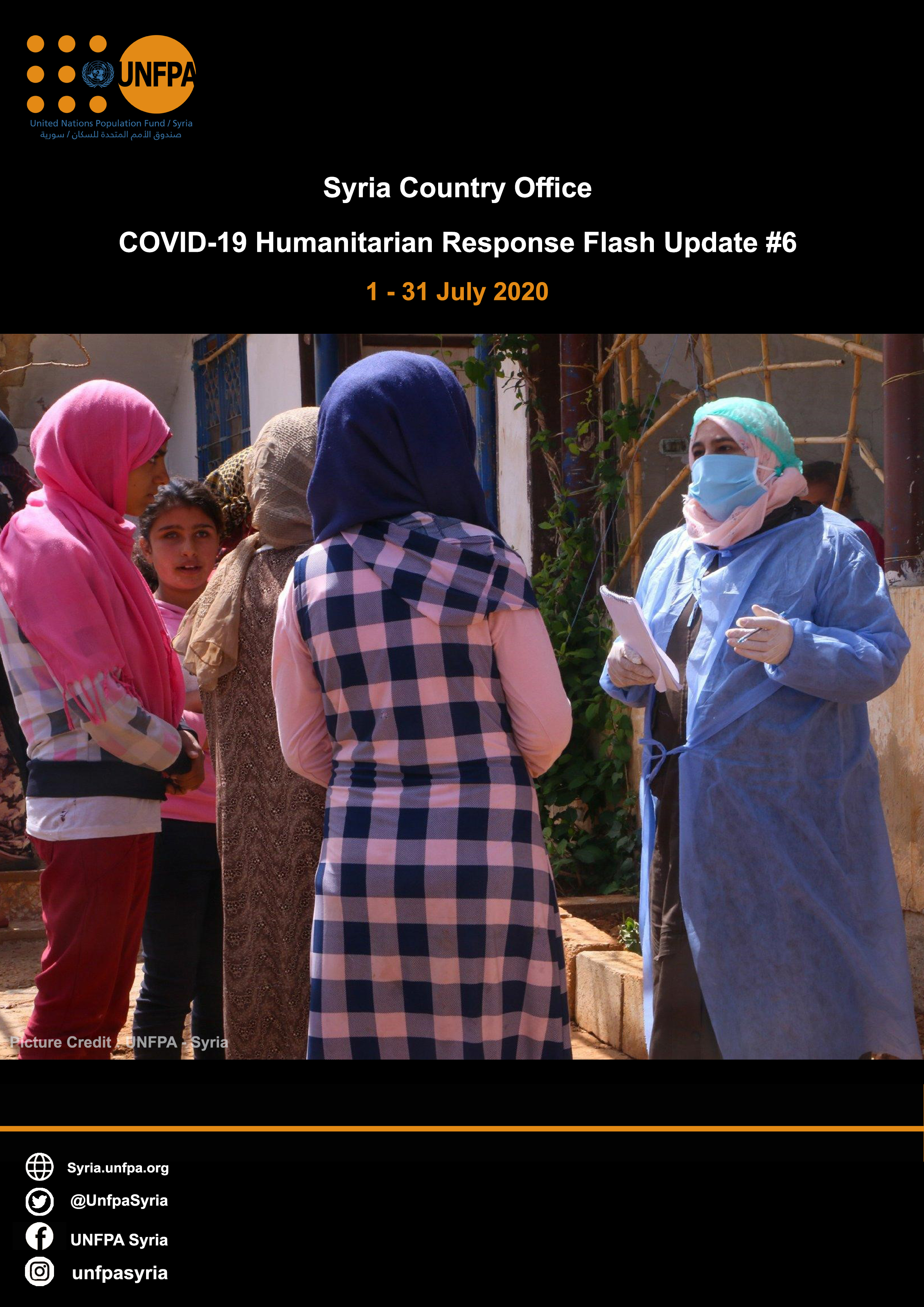
UNFPA - Syria COVID-19 Humanitarian Response Flash Update #6 : 01- 31 July, 2020
As of August 15, 2020, the Syrian Ministry of Health (MoH) has reported 1,593 COVID-19 cases across Syria: 1,125 active, 408 recoveries and 60 registered deaths. The first positive case was announced on 22 March 2020, with the first fatality reported on 29 March 2020.
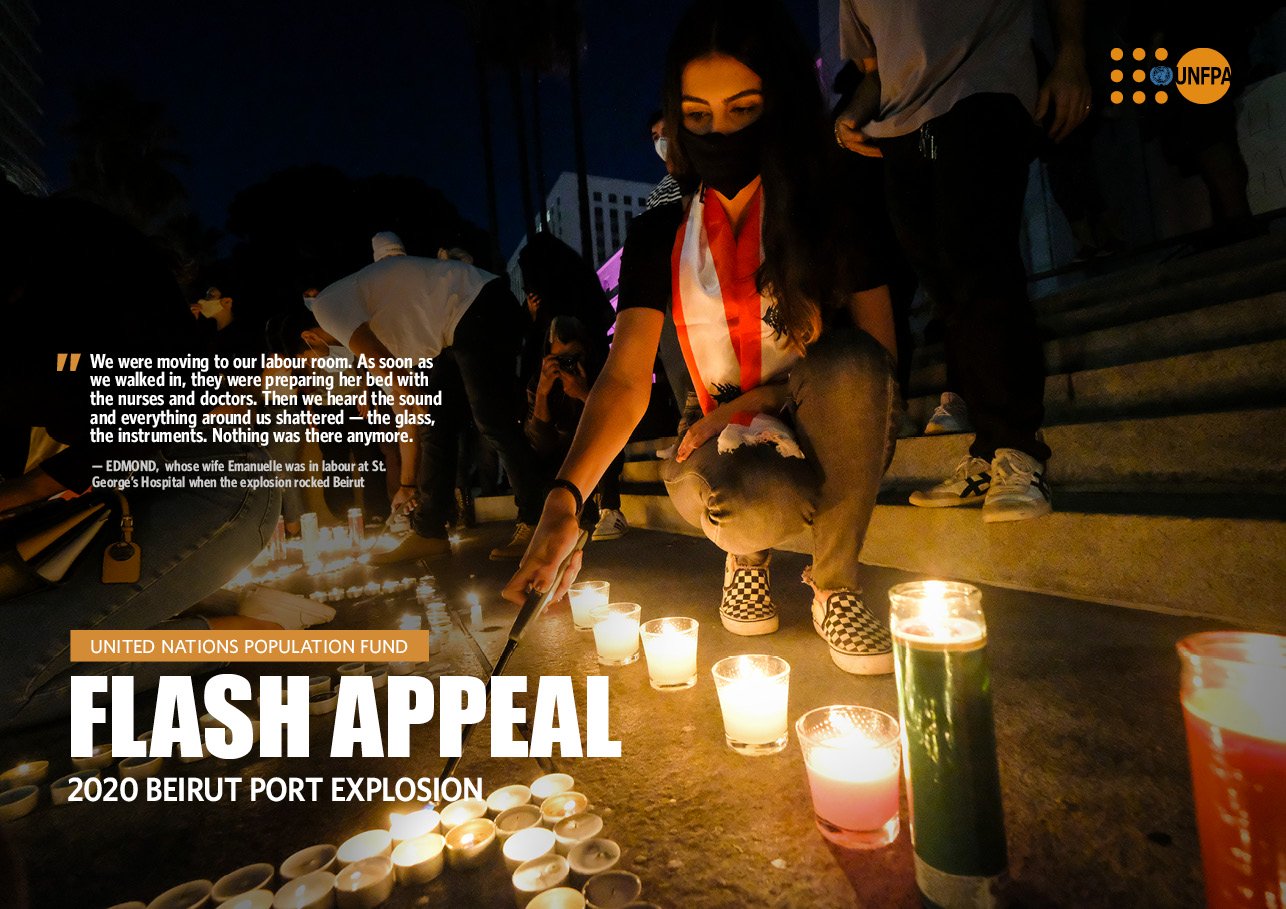
Flash Appeal: 2020 Beirut Explosion
On 4 August, 2020, at approximately 18h00 (local time), a warehouse at the Beirut Port containing large quantities of ammonium nitrate exploded. The initial explosion was followed by a much more substantial subsequent blast that caused widespread damage reportedly reaching more than 20 kilometres from the port area. As of August 11, the death toll from the incident stands at more than 170 and is continually rising as more bodies are recovered from the surrounding wreckage. More than 5,000 people were injured in the blast, with more than 300,000 displaced and dozens reported missing since the incident.
The Beirut Port explosion has created yet another large-scale crisis in a country that is in the midst of a serious economic crisis as well as the COVID-19 pandemic. To respond to these challenges, UNFPA is urgently appealing for US$ 19.65 million to provide lifesaving assistance and meet the emerging needs of those impacted by this crisis.